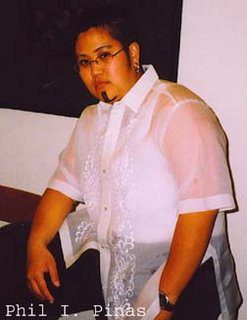
In looking for music that I would feel fit with my drag king ego, Phil I. Pinas, and his committment to a kind of kinging steeped in progressive politics aimed at undoing systems of oppression, I came across MC Kiwi.
If you've never heard of him (especially those of you in the SF Bay Area who can catch him at various events/venues) you should definitely check out his webpage at
www.groundworkmusic.com/ and read up on his blog at
www.livejournal.com/users/kiwizzo/Regrettably, I haven't kinged to MC Kiwi, and it doesn't seem that I will anytime soon (read: as long as I'm in DC). As long as gatekeepers feel that kings should perform to songs that are "popular" (i.e., that the audience will be familiar with)and "entertaining" (i.e., that will make the audience want to drink and otherwise spend more money) I doubt that Kiwi's music, focused on fighting oppression and giving a voice to those long silenced will fit that bill anytime soon.

Okay, maybe I'm just a bit jaded...but after six years in DC (with already too many under the current administration) it's a battle not to be! On one hand, some folks are very up-to-date on formal political happenings--they known bills by their numbers; know what's coming up to vote in the House and the Senate; can name Representatives and Senators and where they're from, beyond their own, etc. While all this certainly makes them knowledgeable, I've also met so many who are down-right pompous, as if anyone who doesn't know these things is beyond stupid, and isn't worth knowing! (Because, of course, nothing is more important than our formal government happenings.)
On the other hand, being within the beltway (the freeway circumscribing the DC area) also seems to lead to lots of folks who's work is in policits (non-profit, governmental, and otherwise) to eschew politics in their entertainment/night-life. I understand that balance is key, and that if you're regularly working 50+ hours at a job that's all about politics, some time "away" might feel very needed. What I don't understand, though, is how people who seem to be all about "politics" can then go on to enjoy messed-up, sexist, racist, classist, homophobic "entertainment." Then again, maybe it's because formal government politics doesn't equal anti-oppression politics.
But I'm forgetting my focus...MC Kiwi...

In any case, I wanted to help get the word out about MC Kiwi. In that vein, I wanted to post the lyrics to just a couple of his songs, from his album,
Writes of Passage: Portraits of a Son Rising.
Disclaimer: I couldn't find a link to his lyrics on-line, so I've transcribed them myself. I can't promise they're 100% accurate, but they're close. (If you know of his lyrics on-line, holler.)
MC Kiwi
“The March”
Writes of Passage: Portraits of a Son Rising
Hey, hey, hey
We got to fight this
Fists up now
We got to bring this
Fists up now
We got to fight this
Fists up now
We got to bring this
Fists up now
Hey, hey, hey
Fuck another dream being deferred
This time the people get the last word
The government’s interpretation of freedom and justice is absurd
The revolution turns at 33 1/3
I observe the hatred
And wonder why people can’t make it
Sitting in the belly buck naked
Getting fed bullets and crap
Once the trigger’s pulled back
Thinking that the only escape is rap or
Selling dime sacks
This economic system got all of our minds trapped
Having the people ask you,
“Why is like that?”
How come we ain’t equal
Why is it that we’d rather put profit over people
That legal injection being put in Mumia’s arm
Should be reason enough for us to quit being calm
And rig the alarm
Reexamine right from wrong
Take it back to where we started from
Song by song
We about to make history
Bring the people all together for the victory
Got to take our freedom back for the proletariat
Where all our people at
What…marching, marching
March to the rhythm of our destiny
Bring the people all together for the victory
Got to take our freedom back from these punk bureaucrats
Where all our people at, come on
What do you do when the school is the prison
I’m sick of struggling
Tired of being a victim
I’ve had it with the exploitation of racism
The everyday oppression of men, women, and children
The people’s frustration over capitalism
That’s why we’re motivating with this rap and rhythm
Pro-people, community based activism
Promoting unity to fight this bitch ass system
We ain’t hating,
We organizing
To get this whole nation uprising
We see liberation at the horizon
The sun shining, the pop-blocking, rap-writing
The flares scratching off the top rhyme and free-styling
We sick of being silent
We speak to be heard
Give a fuck if what you call peace is disturbed
First verse talked about dreams being deferred
All the people ever wanted was what we deserved
We about to make history
Bring the people all together for the victory
Got to take our freedom back for the proletariat
Where all our people at
What…marching, marching
March to the rhythm of our destiny
Bring the people all together for the victory
Got to take our freedom back from these punk bureaucrats
Where all our people at, come on
Ain’t nothing going on but the rent
In this American pie only a few truly own a percent
Cause most people live most of their life in debt
Cause we paying way too much for what we actually get
Is this one bedroom really worth half of one check?
We don’t even get a chance to live life content
While the pigs treat us like the usual suspect
And you still ask why my community’s upset
Because it’s the haves versus the have nots
A half ounce of hope versus one crack rock
A white president and one crooked black cop
The prison industry is the new cash crop
We fighting for our freedom
We ain’t got no choice
Fighting for all of my people who got no voice
This war on the streets
Turned us all into soldiers
So we keep marching
Till we die, till it’s all over
MC Kiwi
“Yours Truly”
Writes of Passage: Portraits of a Son Rising
What’s up? You Ready?
One, two
Let me get a little more on my headphones
That’s cool right there man
I spit for all creatures
Alien and human being
Whether you’re deaf, dumb, blind or all-seeing
Whether you’re Filipino, Korean, Black or Mexican
Whether you’re straight, gay, lesbian, queer, or questioning
Each drop of spit damages every last enemy
To have the hardest rappers challenging their masculinity
And break down every phobia and every last -ism
Clean out the whole house and take out the crash rhythm
No such thing as a debate when you inject hate
And you wonder why men and women can’t communicate
And you wonder why we still suffer to this day
Oh you ask, could it be that perhaps Kiwi’s gay
Ask my fiancé and she’ll say, “all of the above”
It doesn’t matter who I come across
It’s all love
Regardless what color, age, size or gender
Go ahead, hold your head up, proud
Just remember that
This is for you and yours
Coming from yours truly
This life is one big battle
This is my tour of duty
The pure beauty that lives in all people
Until we’re all equal
We fight, so off we go
Because my folks are still suffering
Look at how the system do me
This life is one big battle
This is my tour of duty
The pure beauty exists in all people
Until we’re all equal
We fight, so off we go
Yeah my shit stinks
Shame on me to forget, go figure
An emcee trying to keep his ego in check
I’m trying to show all of my people respect
To represent, give a voice to everyone of Filipino descent
I’m trying to be about something that’s bigger than Kiwi
Bigger than pop culture, Mc Donalds, and MTV
Bigger than …
Bigger than gold fronts
And bigger than whatever Shaq eats for lunch
We ain’t have a choice in this paradise you gotta struggle
It’s easy for me to hate, but I can’t knock the hustle
We made the most out of living in this concrete jungle
Young knuckleheads always getting in a lot of trouble
I keep it honest, humble,
And just accept fear
Remind myself that I paid hella dues to get here
So now worries, I’m loving this mad journey
But I got a ways to go
Still getting my hands dirty, because
This is for you and yours
Coming from yours truly
This life is one big battle
This is my tour of duty
The pure beauty that lives in all people
Until we’re all equal
We fight, so off we go
My folks are still suffering
Look at how the system do me
This life is one big battle
This is my tour of duty
The pure beauty exists in my people
Until we’re all equal
We fight, so off we go
This is for you and yours.









